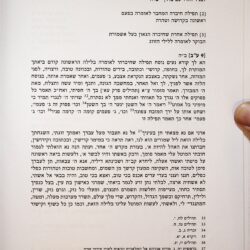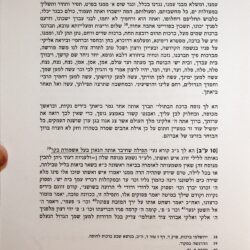| Source (Hebrew) | Translation (English) |
|---|---|
הא לך קורא נעים נוסח תפילה שחיברתי לאומרה בלילה הראשונה קודם ביאתך המותרת לך, בחופה, קדושי׳ וכתובה, בידים טהורות, ובכוונה טובה, ורצויה, לפני המזוזה, אחר נשקתה, באצבע הנקראת אצבע, ג׳ פעמים, |
Here, dear reader, is a prayer for you that I composed to be recited on the first night— before your permitted intercourse, by virtue of the marriage canopy, wedding ceremony, and marriage contract— with pure hands and a good, desirable intent, before the mezuzah, after you have kissed it, with the index finger, three times. |
ואחר שאמרת אותה, בנוסח הלזה אשר לפניך, לך ואל תאחר, במחשבה הגונה, ותכף ומיד עשה ותצלח, מאת ה׳ המבורך. |
After you have said it, in this formulation that is before you, go and do not tarry, with the proper thought, immediately and right away do it and you will succeed, with the help of Hashem the blessed One. |
תאמר מזמור ע״א [תהלים ע״א] בְּךָ־ה׳ חָסִיתִי… |
Recite Psalms 71, In you, Hashem, I seek refuge… |
ואח״כ תאמר כל פסוקים אלו |
and then say all these verses: |
אֲדֹנָי נֶגְדְּךָ כׇל־תַּאֲוָתִי וְאַנְחָתִי מִמְּךָ לֹא־נִסְתָּרָה׃ (תהלים לח:י) |
Master, all my desire is before You, and my groaning is not hidden from You (Psalms 38:10) |
שִׁוִּיתִי ה׳ לְנֶגְדִּי תָמִיד כִּי מִימִינִי בַּל־אֶמּוֹט׃ (תהלים טז:ח) |
I have set Hashem before me always: because They are at my right hand, I shall not be moved (Psalms 16:8) |
וַיֹּאמֶר ה׳ אֶל־הַשָּׂטָן יִגְעַר ה׳ בְּךָ הַשָּׂטָן וְיִגְעַר ה׳ בְּךָ הַבֹּחֵר בִּירוּשָׁלָ͏ִם הֲלוֹא זֶה אוּד מֻצָּל מֵאֵשׁ׃ (זכריה ג:ב) |
And Hashem spoke unto the Accuser, “Hashem rebukes you, the Accuser, Hashem who has chosen Jerusalem rebukes you! For this is a brand plucked from the fire.” (Zechariah 3:2) |
פסוק זה ג׳ פעמי׳ וְשָׁחַט אֹתוֹ עַל יֶרֶךְ הַמִּזְבֵּחַ צָפֹנָה לִפְנֵי ה׳ וְזָרְקוּ בְּנֵי אַהֲרֹן הַכֹּהֲנִים אֶת־דָּמוֹ עַל־הַמִּזְבֵּחַ סָבִיב׃ (ויקרא א:יא) |
and this verse three times: And he shall slaughter it on the side of the altar northward before Hashem, and Aharon’s sons, the Kohanim, shall dash its blood against all sides of the altar. (Leviticus 1:11) |
ג׳ פעמים קוּמָה ה׳ קַדְּמָה פָנָיו הַכְרִיעֵהוּ פַּלְּטָה נַפְשִׁי מֵרָשָׁע חַרְבֶּךָ׃ (תהלים יז:יג) |
three times: Arise Hashem, go forth to meet him, Bring him down; rescue me from the wicked with Your sword (Psalms 17:13) |
ג׳ פעמי׳ |
three times[1] We are uncertain whether this additional “three times” instruction is intended to convey exclamation, or if this entire preliminary section was intended to be repeated three times. Please leave a comment or contact us if you know more. |
אחר כך תאמר תפילה זו |
After that, recite the following prayer: |
אדני אם נא מצאתי חן בעיניך אַל־נָא תַעֲבֹר מֵעַל עַבְדֶּךָ[2] פניית אברהם אל המלאכים הבאים לענין עיבור שרה. (בראשית יח:ג) ואמתך זוגתי, השגחתך בלילה הזאת ליל שמורים הוא לנו, ראה תראה כי במימר קדישין, ובכתובה וקידושין, חברתנו את האהל להיות א׳, בעזרת מקדש ה׳ אחד |
Master, if I have found favor in Your eyes, do not turn away from your servant (Genesis 18:3) and your handmaiden my spouse. May Your providence protect us on this night, which is a night of watchfulness for us.[3] find Exodus 12:42 You shall surely see that through holy speech, the marriage contract, and the betrothal, we have combined the tent to be one, with the help of the Temple of Hashem [who is] One. |
ועתה הנה נא הואלתי לגמור חובתי המוטל עלי מאמר פומך, ודבק באשתו וְהָיוּ לְבָשָׂר אֶחָד, ולעשות ביאה ראשונה על מיטתי ואשתי אעלה, ליחדא קב״ה ושכינתא דיליה, אנא ה׳ צבאות, תן לעבדך סימן לטובה אות, הַשְׁקִיפָה מִמְּעוֹן קׇדְשְׁךָ מִן־הַשָּׁמַיִם, ומחשבות טובות וטהורות כפלי כפלים, חננו וענני בַּעֲדִי עֲדָיִים |
And now, since I have taken upon myself the duty that is incumbent upon me[4] Find Genesis 18:27 by the word of Your mouth: And he shall cling to his wife and they shall be one flesh,[5] Genesis 2:24 to perform the first intercourse on my bed, to ascend to my wife, for the unity of the blessed Holy One and the Shekhinah, please Hashem Tsevaot, give your servant a good sign, look down from Your holy abode from heaven,[6] (Deuteronomy 26:15 and with good and pure thoughts, doubled and redoubled, favor me and answer me with excellent ornaments.[7] Ezekiel 16:7 |
אכנס בכי טוב, ואצא בכי טוב, והיה בבאי אל אשתי, לא אשחית ארצה, לבלתי נתן זרע לגמר ביאתי, שמרני כאישון בת עין, בְּצֵל כְּנָפֶיךָ תסתיר כחתי, מעייפות וחלשות תשמרם ותנצרם |
Let me enter in the best manner and leave in the best manner, and when I come to my wife, let me not spill on the ground and thereby not give seed to finish my intercourse.[8] Find Genesis 38:9 Preserve me like the pupil of an eye, in the shadow of Your wings conceal[9] Psalms 17:8 my strengths; from weariness and weakness guard and preserve them. |
ומעלי כל נזק, וגרם נזק, שדין, ולילין, תרחיקם ובשמך הגדול, והקדוש, שדי מלך עולם, תשדד מערכות מעלה, ומטה, המתנגדי׳ לי, ולאשתי, לעשות המוטל עלינו בלילה הזאת |
Remove from upon me all damage and cause of damage, demons and malevolent entities[10] or possibly, incubi and succubi — keep them away, and with your great and holy Name, Shadai, cosmic majesty, overturn the forces above and below, those who oppose me and my wife, doing what is incumbent upon us on this night. |
וכמו כן כל כשוף וקישור ושנאה וקטטה היכול הדעת לחשוב והפה לדבר, שאולי נעשה, או יכול להעשות, הושם, או יכול להשים, בין מאיש בין מאשה, קטן וגדול, שם הוא מבני עמנו, ומשלא מבני עמנו, נגדנו בכלל, ונגד שום א׳ ממנו בפרט, תסיר ותתיר ותשליך במצולות ים, כל מחשבותם, ופעולותם, המה יושברו ואתה תעמוד, כולם כבגד יכלו, כלבוש תחליפם ויחלופו |
Likewise, all magic spells and enchantments and hatred and quarrels that the mind can think of and the mouth utter, that perhaps was done, or can be done, that was applied, or can be applied, whether from a man or from a woman, large or small, which was placed by one of the sons of our nation, or by one who is not from the sons of our nation, against us in general, and against any one of us in particular, remove, and release and cast in the depths of the sea,[11] Find Micah 7:19 all the thoughts and actions. Let them be broken and you shall stand, all of them shall wear out like clothing, may You change them like a garment and they will disperse. |
ואתה הוא ורחמיך לא יתמו, לבני עבדך ישכונו, וזרעם לפניך יכונו, תשכון בפוריינו אהבה אחוה, שלום וריעות[12] תלמוד ירושלמי ברכות ד׳:ב׳:ז׳. בנושא שבע ברכות לחופה. ומעלייותא טובא |
And You, Your mercy shall not end, let them [the newlyweds] dwell with the sons of Your servant, may their seed be established before You; may there dwell in our fertility, love and brotherhood, peace and friendship,[13] find Jerusalem Talmud Berakhot 4.2.7 and good virtues. |
תברכנו בִּרְכֹת שָׁמַיִם מֵעָל, בִּרְכֹת תְּהוֹם רֹבֶצֶת תָּחַת, בִּרְכֹת שָׁדַיִם וָרָחַם, (בראשית מט:כה) נתן תתן לנו, וממנו, זרע של ברכה, מסטרא דימינא, ומעלמא דדוכרא, בחן ובחסד וברחמי׳ וביראת אליקי׳ על פניו בנשמה הקדושה, ובעייון ורצון ושכל טוב לתורה צוה לנו משה מורשה, מברכות פיך תברכנו, נזכה ונחיה ביחודא דלבא וגופא, יחד ניחד שם קדשך |
Bless us with blessings of heaven above, blessings of the deep that crouch beneath, blessings of the breasts, and of the womb (Genesis 49:25). You shall surely give us, and from us a seed of blessing, from the Right Side, and from the world of the male, with grace, compassion, mercy, and with fear of Elohim upon him through the holy soul, and with intelligence and will and a good mind for the Torah that Mosheh commanded to us as a heritage. Bless him with the blessings of Your mouth, and may we merit to live in unity of heart and body, and together unify Your holy Name. |
ויבורך בית עבדך, ובית יש׳ הבוטח בך מעתה ועד עולם, אמן, אמן, אמן, נצח, נצח, נצח, סלה, סלה, סלה, ועד, ועד, ועד |
May the household of your servant be blessed, and the house of Israel who trusts in you, from now and forever, Amen, amen, amen, netsaḥ, netsaḥ, netsaḥ, selah, selah, selah, forever, forever, forever. |
יִהְיוּ־לְרָצוֹן אִמְרֵי־פִי וְהֶגְיוֹן לִבִּי לְפָנֶיךָ ה׳ צוּרִי וְגֹאֲלִי׃ עשה למען שמך, עשה למען ימינך, עשה למן תורתך, עשה למען קדושתך, עשה למען רחמיך הרבי׳ וחסדך הגדולים, רחם עלינו והושיעיני. |
Let the words of my mouth and the meditation of my heart be acceptable Hashem, my rock and my redeemer (Psalms 19:15). Act for the sake of Your name, act for the sake of Your right hand, act for the sake of Your Torah, act for the sake of Your sanctity, act for the sake of Your many mercies and Your great lovingkindness; have mercy upon us and save me. |
ובמחשבה שתרצה תפילתך, עשה ואל תאחר ביאתך. |
And then, with the thought that your prayer will be accepted, go ahead and do not delay your intercourse. |
This prayer, “Tiferet baḥurim (The Glory of Young Men)” by Pinḥas Barukh Monselice is found in a manuscript, Oxford, Bodleian Library Ms. 1418 Regg. 33 (Ferrara, from the second half of the 17th century). A transcription was first made and published as: Pinchas Monselice, Tif’eret baḥurim: Madrikh ha-ḥatanim ha-Yehudi ha-rishon (Glory of Young Men: The First Jewish Guide-book for Weddings), ed. Roni Weinstein (Jerusalem: Ben Zvi Institute, 2010), pp. 260–261. The English translation here is based upon that first made by Jeffrey M. Green and published at the Posen Library (in The Posen Library of Jewish Culture and Civilization, vol. 5). (Thank you!) A few small modifications have been made, mainly to the re-Hebraicization of divine names, the inclusion of several notes found in the published transcription, and to the translation of “shedin” and “lilin.” Where verses were cited with ובו׳, I have added the full verse. –Aharon Varady
Source(s)
Notes
| 1 | We are uncertain whether this additional “three times” instruction is intended to convey exclamation, or if this entire preliminary section was intended to be repeated three times. Please leave a comment or contact us if you know more. |
|---|---|
| 2 | פניית אברהם אל המלאכים הבאים לענין עיבור שרה. |
| 3 | find Exodus 12:42 |
| 4 | Find Genesis 18:27 |
| 5 | Genesis 2:24 |
| 6 | (Deuteronomy 26:15 |
| 7 | Ezekiel 16:7 |
| 8 | Find Genesis 38:9 |
| 9 | Psalms 17:8 |
| 10 | or possibly, incubi and succubi |
| 11 | Find Micah 7:19 |
| 12 | תלמוד ירושלמי ברכות ד׳:ב׳:ז׳. בנושא שבע ברכות לחופה. |
| 13 | find Jerusalem Talmud Berakhot 4.2.7 |

“תפילה בלילה הראשונה קודם ביאתך | Prayer for the first night after a wedding, by Pinḥas Barukh Monselice (ca. late 17th c.)” is shared through the Open Siddur Project with a Creative Commons Attribution-ShareAlike 4.0 International copyleft license.











Leave a Reply